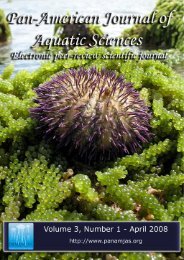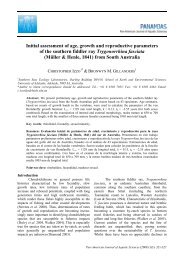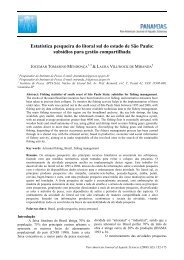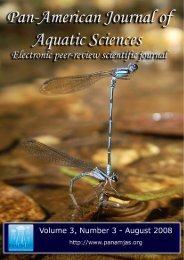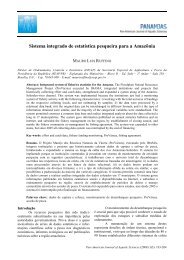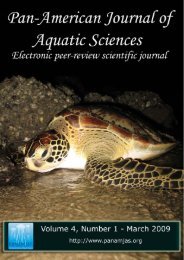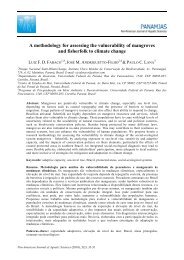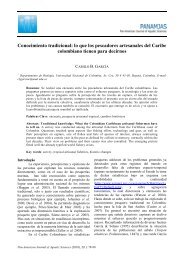Download full issue - PanamJAS
Download full issue - PanamJAS
Download full issue - PanamJAS
Create successful ePaper yourself
Turn your PDF publications into a flip-book with our unique Google optimized e-Paper software.
The nuisance of medusae to shrimp trawls from the perspective of artisanal fishermen<br />
315<br />
members of the communities (Table I).<br />
Formalin-fixed individuals of seven species<br />
of medusa frequently caught in trawl nets in the area<br />
(Lychnorhiza lucerna, Phyllorhiza punctata,<br />
Chrysaora lactea, Chiropsalmus quadrumamus,<br />
Tamoya haplonema F. Muller, 1859, Olindias<br />
sambaquiensis and Rhacostoma atlantica,) were<br />
displayed to the fishermen. After observing the<br />
material, the fishermen were asked the following<br />
questions about the various species: I) popular<br />
names and diagnostic characteristics; II) toxicity and<br />
treatments; III) seasonality, occurrence patterns and<br />
atypical occurrences; IV) biological aspects of<br />
medusae; and V) methods employed to prevent<br />
nuisance to trawl caused by large populations of<br />
medusae.<br />
The data was analyzed according to the<br />
model of union of all individual competences. Every<br />
piece of information concerning the subject was<br />
taken into account, and a quali-quantitative<br />
treatment of the data was conducted (Marques<br />
1991).<br />
Table I. Number of fishermen interviewed on each fishing community from Paraná (PR) and north Santa<br />
Catarina (SC) coast.<br />
Community sampled Standardized interviews Opened interviews<br />
Pontal do Sul (PR) 8 4<br />
Atami (PR) 2 1<br />
Barranco (PR) 1 -<br />
Shangrilá (PR) 7 6<br />
Ipanema (PR) 1 -<br />
Praia de Leste (PR) 7 1<br />
Caieiras (PR) 5 2<br />
Brejatuba (PR) 9 3<br />
Barra do Saí (SC) 7 2<br />
Itapema do Norte (SC) 1 1<br />
Total 48 20<br />
Results<br />
Standardized interviews with trawl<br />
fishermen. Among the 48 interviewed fishermen,<br />
ages varied from 26 to 70 years (mean of 44,<br />
standard deviation of ± 12.98). Half of them had<br />
been in the fishing trade for more than 30 years and<br />
22.9% made exclusive use of trawling gear.<br />
Most fishermen (70.8%) claimed financial<br />
losses caused by high densities of medusae.<br />
A smaller percentage (29.17%) failed to<br />
correlate medusae with economic loss, but<br />
acknowledged time wasted and regarded<br />
the medusae as natural nuisances to the fishing<br />
activity (Table II).<br />
Table II. Answers about the jellyfish effect on fishing, following interviews (n = 48) to fishermen.<br />
Questions Yes No<br />
Do jellyfish cause economic losses to trawlers? 70,83% 29,17%<br />
Have you ever avoided fishing because of the large amount of jellyfish? 58,33% 41,67%<br />
Have you ever hurried your return from a fishery because of the large number of<br />
jellyfish?<br />
68,75% 31,25%<br />
Among 34 respondents who claimed some<br />
economic loss, 73.5% reported a concomitant<br />
scarcity of shrimp in the same period (n=25) and<br />
58.8% referred to extra fuel expenses to avoid<br />
medusae aggregations (n=20). Whenever a dramatic<br />
amount of large medusae was caught, 29.4% of the<br />
respondents (n=10) conveyed that they opened the<br />
cod-end, releasing all catches, including the shrimps.<br />
When the same 34 respondents were asked about<br />
what measures they took to mitigate the losses, 25%<br />
(n=8) answered none. Those who replied<br />
affirmatively (75%, n=26) said that they had<br />
changed their regular trawl activities to: I - fishing<br />
with gill nets (n=17); II - fishing at night, when the<br />
jellyfish move up to the surface (n=10); III - make<br />
use of gimmicks to reduce the amount of jellyfish<br />
during shrimp trawls (n=9); IV - explore other, more<br />
distant places such as Superagüi Island (n= 2).<br />
There was marked similarity in the<br />
following reports from the respondents (n=48):<br />
I – Influence on trawling – A view of<br />
medusae as pests, a cause of clogging of trawl nets,<br />
reduction in trawling time and time wasted.<br />
II - Accidents with toxic species – All<br />
Pan-American Journal of Aquatic Sciences (2009), 4(3): 312-325



